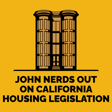Become a Creator today!Start creating today - Share your story with the world!
Start for free
00:00:00
00:00:01

Episode 1: What we need to accomplish, and why it's at the state level
Introduction - who I am, why I care so nerdily about housing and why California legislation in particular, and what I'm hoping to do with this podcast. Brief primers on zoning, parking, discretionary approvals, and more of the many topics that will surely come up in 2024 legislation.
